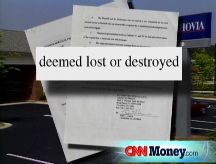Senate holiday on housing rescue
The debate over foreclosure prevention legislation hit a roadblock this week, but will continue after July 4. But chances are still high for eventual approval.
NEW YORK (CNNMoney.com) -- After failing to approve an omninbus housing rescue package this week, the Senate is scheduled take up the bipartisan-supported bill again the week of July 7.
What dragged the bill down this week had little to do with the substance of foreclosure relief. Instead it was stymied by a procedural maneuver on Wednesday by Sen. John Ensign, R-Nev., who is pushing a series of energy tax breaks, and a backlog of legislation that the Senate was scrambling to complete before its July 4 recess.
On Wednesday, a clearly frustrated Banking Committee Chairman Christopher Dodd, D-Conn., who negotiated the housing legislation, said lawmakers were close to getting passage on the bill "if only we can get it to the floor."
The Stanford Group, a policy research firm, dropped its odds of enactment to 70% based on the delays.
"Every day that passes is another opportunity for special interests to try to change the bill. Those changes could unravel the bipartisan compromise and sink the legislation," wrote analyst Jaret Seiberg in a research note. But, he added, "we justify such high odds despite the current troubles as we continue to see passage as politically important to both parties."
The housing package would create a new government-backed program to help at-risk borrowers. It also would change how two of the biggest players in the mortgage market are regulated and alter key rules in how they may operate. Furthermore, it proposes measures intended to spur activity in the housing market.
Dodd and other leading senators were engaged in talks with House Financial Services Chairman Barney Frank, D-Mass., this week to iron out differences between the Senate version of the housing package and the foreclosure-prevention bill that the House passed in May.
If those differences get worked out, the bill that the Senate passes is very likely to pass the House as well.
The White House has signaled that President Bush would veto the Senate bill in its current form. As a result, one element lawmakers are likely to discard is a provision that would give $4 billion in aid to states to buy up foreclosed properties - a measure the White House contends would do more to aid lenders than homeowners.
Even with amendments, the key measures likely to appear in the final bill are intended to prevent foreclosures, spur the housing market and increase oversight of Fannie Mae and Freddie Mac.
The provision that has garnered the most attention is one that would allow the Federal Housing Administration to insure up to $300 billion in new loans for at-risk borrowers if lenders agree to write down loan balances below the appraised value of borrowers' homes.
The program, which would be voluntary for both lenders and borrowers, would be paid for in the Senate bill by the premiums borrowers pay and by fees from Fannie (FNM, Fortune 500) and Freddie (FRE, Fortune 500), the two government-sponsored enterprises that guarantee the purchase and trade of mortgages.
Critics of the plan say lenders are more likely to saddle the program with their worst loans - those most likely to foreclose. The Congressional Budget Office estimates that the program would end up guaranteeing 400,000 loans worth $68 billion, and of those, about a third would result in default. The CBO estimates the net loss from those defaults would be $680 million, or 1% of the total loan amounts guaranteed.
Another provision would raise the cap on the size of mortgages guaranteed by Fannie and Freddie to $625,000 from $417,000. The House version raises the limit to nearly $730,000.
House Speaker Nancy Pelosi, D-Calif., whose state has some of the priciest real estate in the nation, made her preference clear in a press conference on Thursday. "We want higher limits. That is the reality of life in Massachusetts, in California, in New York, in Connecticut, and in many places in the country." But, she added, "When the bill is agreeable to Mr. Frank, it will be agreeable to me."
The bill also calls for a new regulator to oversee Fannie and Freddie, but Democrats are trying to amend the bill so that the regulator would not be put in place until the next president takes office.
Among the tax breaks in the legislation is a one-year tax credit for first-time buyers that would be worth up to $8,000. But in effect, the credit would work as an interest-free loan that the home buyer would eventually need to repay. ![]()




